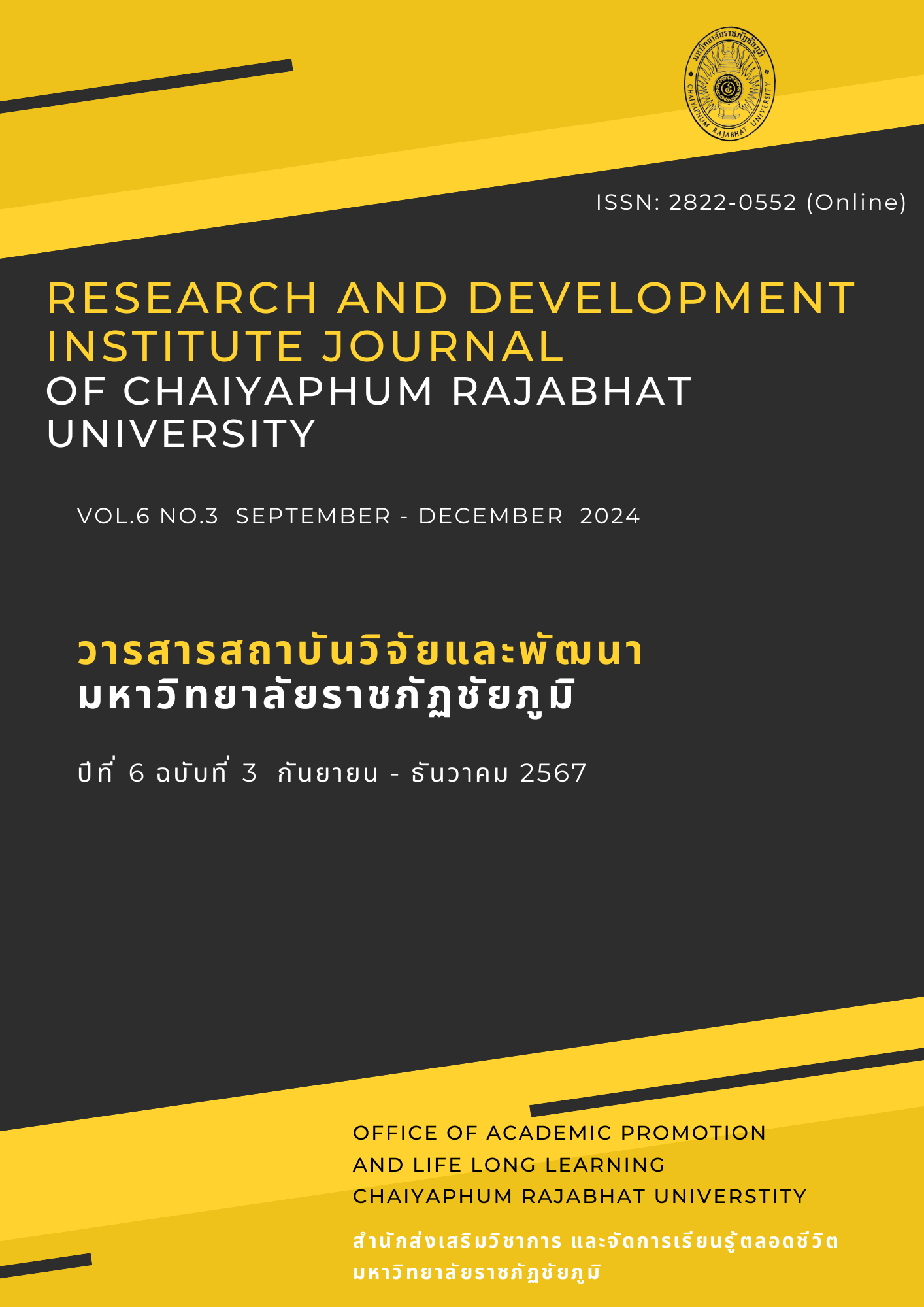THE SUSTAINABLE MANAGEMENT GUIDELINES FOR COMMUNITY-BASED AGRO-ECOTOURISM IN CHAIYAPHUM PROVINCE
Main Article Content
Abstract
The objectives of the research on the sustainable management guidelines for community-based agro-ecotourism in Chaiyaphum Province were: 1) to study the management of community-based agro-ecotourism; 2) to investigate the impacts of the management of community-based agro-ecotourism in terms of economy, society and environment; and 3) to explore the sustainable management guidelines for community-based agro-ecotourism. Quantitative research data were collected from 200 subjects in the research area and qualitative data were collected from 12 stakeholders in community-based agro-ecotourism management by focus group discussions and 6 key informants by in-depth interviews to explore the sustainable management guidelines for community-based agro-ecotourism. Data were analyzed using frequency, percentage, mean, standard deviation and content analysis.
The analysis results of the management of community-based agro-ecotourism revealed that the overall opinion of the people on the management of community-based tourism was at a high level. When analyzing each aspect, the aspect of society, traditions, and community culture gained the highest mean scores, followed by the environment, tourist services, and community economy, respectively. The study results on the impacts of the management of community-based agro-ecotourism in terms of economy, society and environment can be presented as follows. Regarding the economy, people have increased income and have jobs in the local area. Facilities and community identity have been developed to attract tourists. The negative impacts also have included inequality in the community and exploitation by certain groups of people. In terms of social/traditional/cultural impacts, people have knowledge and understanding of community tourism management, and can adapt and use the wisdom, traditions, culture, and identity of the community to develop products that can improve their quality of life. The negative impacts have included inequality in the community and nearby communities that have not been involved in the tourism activities, lack of participation and conflict in the community, risk of safety of life and property, and drug problems. In terms of the environment, the areas have been improved to be orderly and beautiful. Houses, toilets have been improved to be clean and hygienic. Food is also safe and clean. People also have more knowledge and understanding in caring for the environment and natural resources. As for the negative impacts on the environment, a large amount of waste and degradation of natural resources have been found. The sustainable management guidelines for community-based agro-ecotourism can be summarized as follows. 1) Tourism promotion policy must specify a clear and continuous community tourism development plan and give local administrative organizations a role in driving the tourism development policy. 2) Public participation and network partners in developing community-based agro-ecotourism are required. 3) Tourism activities that emphasize the way of life, community lifestyle, community identity should be organized and served as sources of learning for tourists about agricultural activities and ecosystem and community environment that are balanced and sustainable. 4) A good, efficient, ethical tourism management system that reduces inequality in the community should be implemented in the form of the committee with government agencies as advisors. 5) The potential of local personnel should be developed. 6) Local agricultural products should be promoted.
Article Details

This work is licensed under a Creative Commons Attribution-NonCommercial-NoDerivatives 4.0 International License.
Permission to use text, content, images, etc. of publication. Any user to read, download, copy, distribute, print, search, or link to the full texts of articles, crawl them for indexing, pass them as data to software, or use them for any other lawful purpose. But do not use it for commercial use or with the intent to benefit any business. Published under a Creative Commons Attribution-NonCommercial-NoDerivatives 4.0 International License.

This work is licensed under a Creative Commons Attribution-NonCommercial-NoDerivatives 4.0 International License
References
กระทรวงการท่องเที่ยวและกีฬา. (2558). รายงานประจำปี พ.ศ. 2558. https://www.mots.go.th/download/article/article_20151005153149.pdf
กระทรวงการท่องเที่ยวและกีฬา. (2560). รายงานประจำปี พ.ศ. 2560. https://www.mots.go.th/download/AnnualReport2560resize.pdf
กรมการท่องเที่ยว. (2565). แผนพัฒนาการท่องเที่ยวแห่งชาติ ฉบับที่ 3 (พ.ศ. 2566 – 2570)กรุงเทพมหานคร: สำนักงานพัฒนาการท่องเที่ยว. https://province.mots.go.th/ewtadmin/ewt/ranong/download/article/article_20230418122435.pdf
เจษฎา นกน้อย. (2559). การท่องเที่ยวเชิงเกษตร : แนวคิดและประสบการณ์. วารสารวิชาการ มหาวิทยาลัยหอการค้าไทย มนุษยศาสตร์และสังคมศาสตร์, 36(2), 157–169
ชูวิทย์ ศิริโชคเวชกุล. 2544. การท่องเที่ยวโดยชุมชน. ม.ป.พ.
บุญชม ศรีสะอาด. (2554). การวิจัยเบื้องต้น (พิมพ์ครั้งที่ 9). สุวีริยาสาส์น.
ยุทธพงษ์ กัยวรรณ์. (2543). พื้นฐานการวิจัย. สำนักพิมพ์สุวีริยาสาส์น.
วนิดา อ่อนละมัย. (2563). แนวทางการพัฒนาการท่องเที่ยวอย่างมีความรับผิดชอบชุมชนบ้านสาวะถี จังหวัดขอนแก่น. วารสารเพื่อการพัฒนาการท่องเที่ยวสู่ความยั่งยืน, 2(1) 74-83.
วันทนา ฉิมบ้านดอน. (2552). การท่องเที่ยวเชิงเกษตรในตำบลบางใบไม้ อำเภอเมืองสุราษฎร์ธานี. [วิทยานิพนธ์ปริญญามหาบัณฑิต]. มหาวิทยาลัยเชียงใหม่. http://cmuir.cmu.ac.th/handle/6653943832/35656
วารุณี เกตุสะอาด และปกรณ์ สุวานิช. (2554). การประเมินศักยภาพการท่องเที่ยวเชิงเกษตรของพื้นที่เขตทวีวัฒนา กรุงเทพมหานคร. รายงานสืบเนื่องจากการประชุมทางวิชาการและนำเสนอผลงานวิจัย มสธ. วิจัยประจำปี 2554, 364 – 379.
วีระศักดิ์ กราปัญจะ. (2554). รูปแบบการจัดการการท่องเที่ยวเชิงนิเวศในพื้นที่ป่าชุมชนบ้านอ่าวท่าเลน – บ้านท่าพรุ ตำบลเขาทอง อำเภอเมือง จังหวัดกระบี่. [วิทยานิพนธ์ปริญญามหาบัณฑิต]. มหาวิทยาลัยสุโขทัยธรรมาธิราช.
ศิริภา มณีรัตน์ และ จุฑาทิพย์ เฉลิมผล. (2560). รูปแบบการจัดการท่องเที่ยวเชิงเกษตรที่เหมาะสมของเส้นทางสายแม่ริม-สะเมิง อําเภอแม่ริม จังหวัดเชียงใหม่. แก่นเกษตร,45(ฉบับพิเศษ 1), 540-544.
สำนักงานจังหวัดชัยภูมิ. (2560). ประเด็นยุทธศาสตร์พัฒนาจังหวัดชัยภูมิ. https://www.chaiyaphum.go.th/page_about/about11.php
Sowmya, K.S., Srikanth, C.D., & Sudha, M.. (2014). Agri-Tourism: Innovative Income Generating Activity for Enterprising Farmers. Global Journal of Advanced Research 1(2). 329-332.
Srichaivoung, P., Suksai, L., Phungphet, S., & Jedaman, P. (2020). Ecological Agriculture Tourism Management based on Sustainable Community Participation in Northeast Regions, Thailand. International Journal of Innovative Science and Research Technology, 5(2), 126–128.
United Nations Development Programme. (2022, May 4). UNDP Annual Report 2021. https://www.undp.org/publications/undp-annual-report-2021


